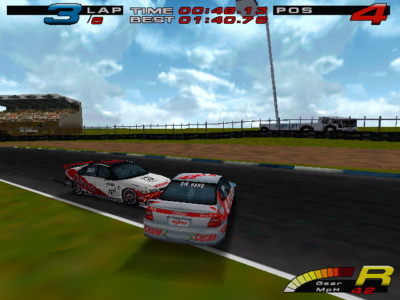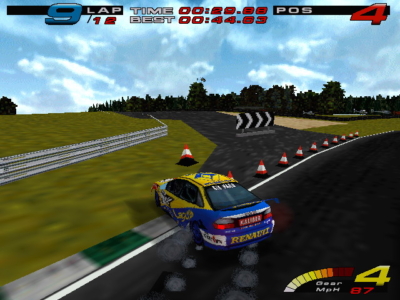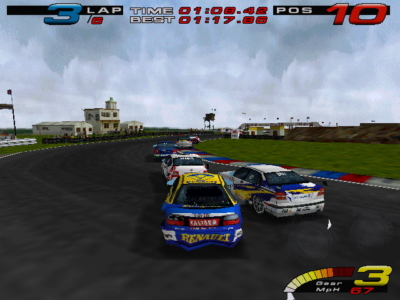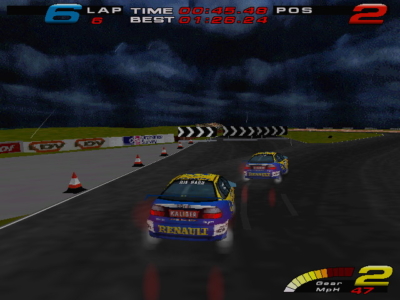Written by: Rik
Date posted: May 9, 2021
We’re 20 this year – and though it may seem a little self-congratulatory to do so, we normally like to mark significant anniversaries in some way.
Returning to the earliest days feels like the obvious way to go, but with our rate of producing new content it also feels like it might not be the best use of time. Particularly, rewriting old reviews seems like a strange way to proceed: celebrating your history by destroying a small part of it.
And so we decided to tie in any looking back with new content, by choosing a related game to cover as well as digging up old stuff. The game will be played again, although probably not always to completion, and set against the newer title as we reflect on the site history and how things have changed over the years. Last time, we managed a discussion; this time, I’m flying solo to take a look back at TOCA Touring Car Championship.
The initial review of this was one I always misremember as being from the very earliest days and later re-written, but I think what is currently here, from late 2004, was as originally published. It’s a game that holds fond memories from carefree teenage years, as we’ve mentioned previously, but received a relatively lukewarm appraisal in our write-up.
TOCA was at that point a fairly straightforward licence, billed as the official game of the British Touring Car Championship. As time went on the series continued and gradually loosened its connection to the BTCC, which became only one of many possible race types in the story-based TOCA Race Driver games. The story, and the TOCA name, were later dropped altogether in the late 00s with Race Driver: GRID, the counterpart newer game reviewed here, with GRID then becoming the brand name of the series.
First things first: this game does actually run on 64-bit Windows, despite a long-held belief of mine that it does not. To be fair, this was based on attempts to fire it up in my Windows XP days and finding a fairly blunt refusal to even install, a fact I completely forgot during a recent dusting-off of the surely-soon-to-perish XP machine, justified on the basis that the anniversary was a special occasion.
Having lugged the old grey box into place, and then back out of place, for seemingly no good reason, I nevertheless resolved to make another attempt to build a virtual machine, or, as a last resort, fire up the PlayStation version on an emulator. But no! It turns out it works just fine on modern Windows, if you just do the first thing that any idiot would do and ensure you run the setup programme in compatibility mode for Windows 98. Hopefully no-one comes here for detailed technical advice as clearly there is more insight available in the comments sections of mammoth download sites.
Delight soon turned to frustration as I remembered how to tricky this game could be, and with early attempts at Race Driver: GRID also being less than successful, I had the dubious pleasure of being crap at two different generations of the same game at once. Here, the extent to which the first couple of tracks in particular need to be mastered in order to earn the requisite number of points to progress was worthy of note at the time and felt overstated in retrospect, but it remains a significant undertaking. Having also admonished my foolish younger self for making too much of the tendency for cars to lurch off and skid unexpectedly, I again found this to actually still be an issue, with several promising positions in races lost due to an unanticipated spin.
The two issues go hand-in-hand when there’s no option to restart a race, and you can only save after two races. As previously noted, if you mess things up in the second, you have to start again. At the time, this seemed incredibly frustrating, and at odds with what a proper racing sim would do. The bar is set pretty high, too, requiring you to earn an average of 20 points per venue, which is the equivalent of a third place finish in both races.
Perhaps the steep learning curve was what drove me to focus a little too much on whether TOCA fell into the ‘arcade’ or ‘simulation’ category. But a racing game with semi-realistic handling and pre-defined goals required for progress was not all that unusual and soon became the norm across consoles and on PC. Ultimately, in TOCA, you’re meant to become British Touring Car Champion, and you’re not going to do that by finishing 7th all the time. This is simply the mechanism the developers have put in place to ensure that have a chance of getting good enough to win. No doubt, it does get a bit repetitive after a while, but driving is repetitive. And there’s something to be said for the old-style racing game where you had to get really good at each track to win.
Contrast that with GRID, which follows the more modern format of roughly a billion races in career mode, none of which ever feels like it totally sticks in the memory. To get around this fact, and that driving fast is quite hard, you have the Flashback system which allows you to rewind the race to before you made your last mistake and do it all over again. It helps you progress – and the game would be very difficult indeed without it – but the fact you need to have these little do-overs makes success feel a little bit hollow. TOCA‘s compensation system is a little more rudimentary: AI cars get a bit tangled up with each other as the race progresses, allowing you to overcome poor qualifying times quite easily, while also meaning that a decent position can sometimes be salvaged from what seems like a potentially race-ending skid.
TOCA was a big hit on PlayStation, and arguably benefited from being released into a pre-Gran Turismo world. The market for a game based on the BTCC wasn’t massive, but at the time it was understood that it was merely a license to hang a decent racer on that wasn’t rally or Formula One. These days, a game based on a single type of vehicle would need to be a pretty close and comprehensive simulation, with TOCA following many other racers down a broader post-GT route of mammoth single-player careers.
In that, and many other respects, Gran Turismo arguably has a lot to answer for. At the time, it felt like finally someone had given some thought to what to do with a racing game beyond the single race/time trial/championship format, and added much-needed depth to the genre, but the effect was that most future releases featured massively lengthy and drawn-out single-player modes that arguably overstayed their welcome. Even as I was parroting the line on FFG that Gran Turismo was great, my PS2 copy of GT3 remained largely unplayed in the 00s, save for some occasional multiplayer. Certainly, I came away from GRID feeling like it could all do with being a bit leaner.
So, even though I wouldn’t change what I said about the structure in TOCA, it can be viewed through slightly more sympathetic eyes now. With the BTCC only being a matter of 12 rounds of 2 races, it sort of needs to be drawn out a little. Although I maintain that the full-length Championship mode, with individual races clocking in at 25-30 minutes each, is surely for sadists only.
Less fathomable is the lack of information about each car. The manual is fairly clear that they do have different attributes, but fails to offer anything further about what they might be, other than that the Audi is 4WD, which gives it a slight advantage in wet conditions. Otherwise, you have to go scurrying off to GameFAQs for a fellow gamer’s past estimate of strengths and weaknesses. Or you could just look at the real-life 1997 Championship results and see which teams finished at the top (it was Audi and Renault). But it would have been good to just have those old-fashioned performance summaries for a few major attributes (handling, top speed, acceleration etc) on the car select screen.
Some clue as to the handling in particular would have been helpful, although some lessons from the later era of analogue control pads come in handy when it comes to saving yourself from catastrophic spin-outs. While feathering the throttle, as necessary in GRID, isn’t possible here, a less ham-fisted approach to acceleration and braking does translate here, and there were occasions that in the old days would have caused me to slam down a button while making fatalistic exclamations of defeat that seemingly became salvageable with a calmer head and a lighter touch. (A part of me does also miss the days when the face buttons on a joypad were used for throttle and brake rather than triggers, and the resultant sore fingers had a certain echo of the physical effort required in real-life racing).
I wrote recently about the challenges of developing a satisfying arcade-style F1 game, which led me to think maybe I was asking the impossible, but going back to TOCA, it seemed to get the balance right: qualifying is necessary, but not long and drawn out; collisions aren’t encouraged but damage modelling is still on the sympathetic side; opponents are good enough to beat you but one mistake on your part is not catastrophic. Although I knew that the AI could do better and was ‘giving me a chance’, it still felt like a good challenge.
In terms of presentation, the pre-race and mid-season media chat is fairly minimal, although last time around, it looks as if I omitted to mention the contributions of Tiff Needell, of 1990s Top Gear, and possibly the owner of the most ’90s car man’ voice imaginable. His voice appearances only really occur at the end of each playable session, and are fairly brief, although as with early football games featuring commentary, the limited nature of his interactions are sort of in the game’s favour, as there’s very little to mess up. I did however find his announcement of my mid-season sacking due to poor performance (what else would it be due to?) delivered over a championship table that showed me still in contention for the title slightly jarring.
On reflection, I was probably a little harsh on TOCA at the time, and it stands up fairly well now. At the time we were possibly trying too hard to look into the future and see how well a game might age, and things were moving on so quickly in terms of visuals, that the 2004 instalment of Race Driver seemed so much more shiny in comparison. On the other hand, the 2019 edition of GRID (just called, confusingly, GRID) doesn’t seem a million miles away from the 2008 version. You can still see some shared heritage between this and Race Driver: GRID, though, and the structure of trying to average consistent decent performance across events remains in place.
The other thing to say is that in the older days of this site, we were imagining that we were then and would ever be able to be in touch with what is happening in modern gaming, and somehow filter out any element of nostalgia when assessing older titles. Perhaps I tried to ensure that the enjoyable multiplayer shenanigans with this game during my teenage years would have nothing to do with an overly positive evaluation.
Clearly, such things are not possible, no more than trying to tell yourself that the music you listened to when you were 17 might not actually be the best music of all time. (I’m now prepared to accept that Pop might not be the best U2 album, but only reluctantly). And, of course, we didn’t think for a minute that this site might still be here 20 years later.
Having revisited TOCA again, it still holds up pretty well as a single-player racer, with its tight control over progress now possible to be seen as a more refreshing counterpoint to the bloated career modes of modern driving games. Other than that, and the feeling that I could have been a little more generous at the time, much of the previous evaluation still stands.
—
TOCA Touring Car Championship is no longer sold commercially, but can be found second-hand, or on download sites, depending on your preferences.






 Posts
Posts